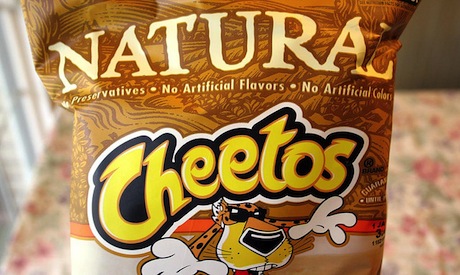
Grocery stores are littered with food products that claim to be “natural” or “all natural” but actually contain artificial ingredients. But lately, the natural food labels have started to disappear, as MSN Money reports. Food and beverages companies are “quietly removing these claims from packages amid lawsuits challenging the "naturalness" of everything from potato chips to ice cream to granola bars,” the article states. Those companies include PepsiCo Inc. and Campbell Soup Co. During the first half of this year, 22.1 percent of food products and 34 percent of beverages launched in the U.S. during the first half of this year were labeled “natural,” according to a report by Datamonitor. That is a decrease from 2009 when 30.4 percent of food products and 45.5 percent of beverages bore the same label.Read more about how labels can be deceiving
There have been a number of lawsuits filed against companies over their “natural” food claims, and those lawsuits make companies reluctant to continue claiming their products are natural when they actually contain artificial ingredients. Last year, the Center for Science in the Public Interest filed a lawsuit against General Mills subsidiary Nature Valley over marketing claims that the company’s granola bars are “natural” when they contain artificial and genetically modified ingredients such as high fructose corn syrup. Safeway, the California grocery store chain, is facing a class action lawsuit filed a few months ago over claims that its Open Nature product line are “100 percent natural.” PepsiCo. settled a lawsuit over natural label claims by its subsidiary Naked Juice by agreeing to pay out $9 million and to stop using the claim “all natural.”
Datamonitor found that only 47 percent of Americans think they can trust “natural” food claim on food and beverages. Clearly, Americans are confused by natural label claims. There is a reason for that confusion. The U.S. Food and Drug Administration (FDA) lacks a definition for “natural” food claims. The federal agency’s website states that the “FDA has not developed a definition for use of the term natural or its derivatives.” The American Society for Nutrition pointed out in an article earlier this year that consumers will continue to be confused by “natural” label claims on food and beverage products until the FDA “adopts a stricter definition of “natural,” consumers trying to make informed decisions should be wary of the “natural” food label and pay close attention to ingredient lists, or choose organic foods that have been produced through a closely regulated process.”Read more about The Scary Seven™
Whole Foods, the natural and organic grocery retailer, has developed a list of ingredients that it considers to be unacceptable. The list of unacceptable ingredients includes artificial colors and flavors, MSG, high fructose corn syrup, saccharin, and sucralose. Whole Foods regularly updates its list, and is requiring that all products containing GMOs sold in its stores must be labeled by 2018. The company’s standards “are becoming an industry standard in the natural/organic sector,” according to the Datamonitor report.
Perhaps federal legislation can help sort out the confusion. A clause in the Food and Drug Administration Act of 2013, introduced in September, states that food manufacturers should not use the term “natural” for foods that contain artificial ingredients, including corn syrup, high-fructose corn syrup, high-maltose corn syrup, maltodextrin, chemically modified starch, and cocoa processed with alkali. The bill doesn’t mention genetically modified ingredients.
Photo Credit: NCReedplayer




